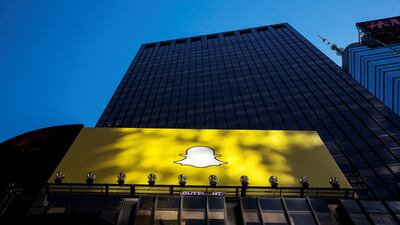Snap reported its first quarterly net profit in the October-December period as the company exceeded analysts’ expectations on earnings and user growth.
The company, which owns social media platform Snapchat, recorded a net profit of $22.5 million, improving from the $113m loss posted in the fourth quarter of 2020.
Snap chief executive
Its revenue surged 42 per cent on an annual basis to about $1.3 billion in the last quarter, exceeding analyst estimates of $1.2bn. It jumped nearly 21.5 per cent on a quarterly basis.
The October-December period was the second consecutive quarter of more than $1bn in sales in the company's history.
Snap's shares soared 57.1 per cent to $24.5 a share in after-hours trading on Thursday.
The company’s net loss for the 2021 financial year stood at more than $487m, improving almost 48 per cent from $944.8m loss posted in 2020. Its January-December sales increased by about 64.2 per cent to more than $4.1bn, nearly $1.6bn more than the revenue recorded in the 2020 fiscal year.
“2021 was an exciting year for Snap and we made significant progress growing our business and serving our global community,” Snap’s chief executive Evan Spiegel said.

“The strength of our core business has enabled us to accelerate our investments in augmented reality, transforming the way that the Snapchat community experiences the world through our camera,” Mr Spiegel said.
Snap said it is building a better way of communicating visually and that it has evolved into a leading platform for augmented reality.
The California-based company’s AR products and services are driving a major impact at scale today, as users use its services to shop, play, learn, explore and entertain, Mr Spiegel said.
“Over 200 million people engage with AR on Snapchat every day, and our community now plays with AR lenses an average of more than six billion times per day. This momentum and the creative energy of the Snapchat community makes us incredibly excited about the future of AR,” he added.
Snap’s daily active users grew to 319 million at the end of last quarter, exceeding analysts’ expectations of 316.9 million. It was an increase of 20 per cent, or 54 million new users, compared to the same quarter in 2020.
This was the fifth consecutive quarter of more than 20 per cent or more year-over-year growth in daily active users, which Snap defines as registered users who open its Snapchat application at least once in a 24-hour period.
The company’s earnings per share rose almost 135 per cent yearly to 22 cents in last quarter, exceeding expectations of 10 cents. Its average revenue per user reached $4.06, surpassing market predictions of $3.79.
Snap reported an adjusted earnings before interest, tax, depreciation and amortisation (Ebitda) of $326.7m in the fourth quarter, an annual increase of about 97 per cent. Its free cash flow stood at $160.9m in the last quarter, jumping more than 300 per cent on a yearly basis.
In its future guidance, Snap expects its revenue to hover between $1.03bn and $1.08bn in the first quarter of 2022, higher than the $1.01bn expected, Refinitiv reported.
It expects its daily active users to reach between 328 million and 330 million in the three months to March 31, surpassing market estimates of 327.8 million.
“As we look forward to Q1, the operating environment remains challenging … many of the supply chain and labour-related headwinds our advertising partners faced in Q4 remain challenges as we enter the Q1,” the company’s chief financial officer Derek Andersen said.

“In addition, while we made significant progress in navigating the iOS platform changes in Q4, we believe that it will take at least a couple more quarters for our advertising partners to build full confidence in our new measurement solutions,” Mr Andersen said.
Changes made by Apple to the iOS platform have affected the way advertising is targeted, measured and optimised.
The iPhone maker’s latest update to its operating system is intended to make it harder for advertisers to track people as they rotate between different apps on their device.
People will be given the choice to opt in or out of app tracking and this will restrict how technology companies such as Facebook and Google gather data for advertising purposes.


